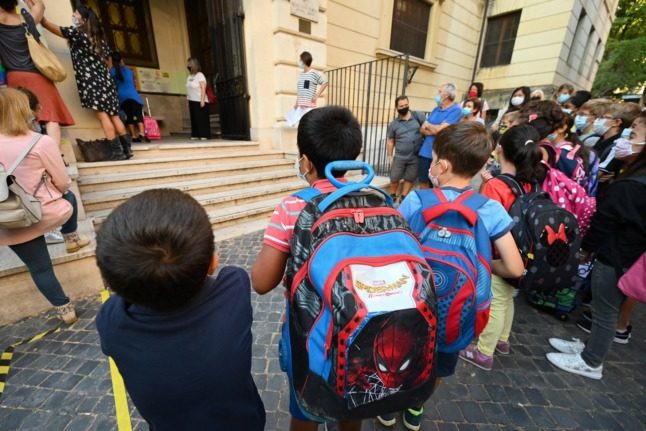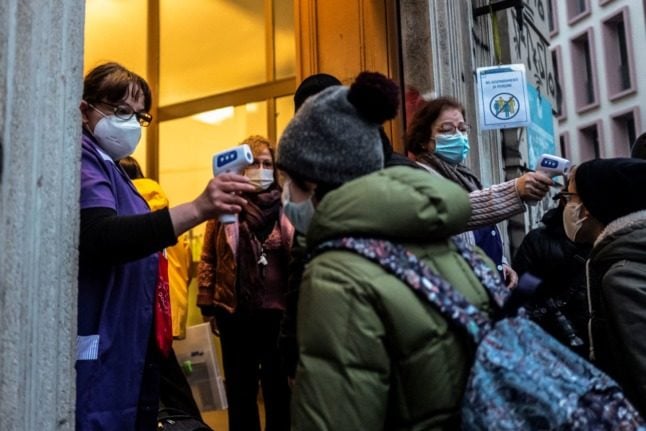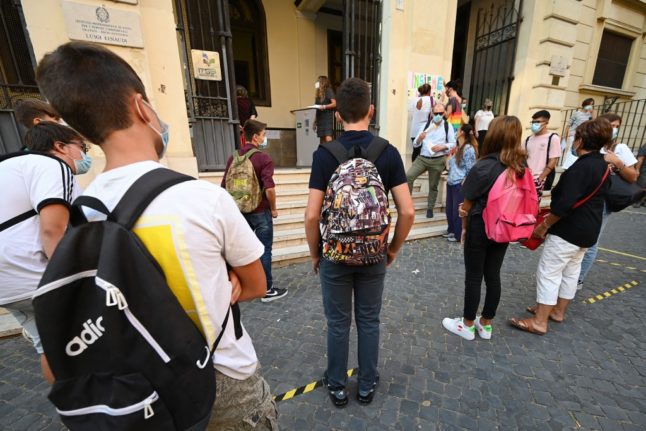The Italian government issued a new decree on Wednesday evening that contains new Covid restrictions aimed at limiting infection rates among schoolchildren while keeping remote learning as a last resort.
In 2022, Italy’s education ministry is hoping that distance learning, or ‘DAD‘ (‘didattica a distanza’), can be kept to a minimum – but a continued surge in the country’s infection rates threatens to disrupt in-person teaching.
Italy has seen record highs in its Covid infection rates in recent days, with 189,000 new cases registered on Wednesday.
READ ALSO: Italian hospitals inundated with Covid patients
A significant proportion of infections are driven by children, many of whom are either too young to get vaccinated or are still waiting to receive their shot, as the European Medicines Agency only approved the Pfizer Cominarty vaccine for use in five to 11-year-olds in late November.
One previously discussed containment measure was the introduction of a significant delay in school reopenings.
Vincenzo De Luca, the governor of Campania, had called for the return to the classroom to be postponed by 20-30 days to “cool down the contagion peak” and to “develop the largest possible vaccination campaign for the student population,” Sky Tg24 news reported.
That proposal ultimately appears to have been discarded, however, as education minister Patrizio Bianchi maintained his position that it is “fundamental to protect teaching in the classroom”.

With most schools set to reopen as planned between January 7th and January 10th, the government hopes its new regulations will allow in-person learning to go on uninterrupted for the majority of students.
The school quarantine rules contained in the new decree consist of a combination of the use of high-grade FFP2 masks in classrooms where one case has been detected, as well as mixed integrated remote and in-person teaching in classes that have had more than one case, with a student’s continued presence in school dependant on their having been recently vaccinated or boosted.
In nurseries and kindergartens, a single case of Covid will result in the institute being required to shut down for 10 days, as young children still can not be vaccinated and infections are likely to spread very quickly.
READ ALSO: EXPLAINED: What’s in Italy’s latest Covid decree?
In primary schools, a single case will not trigger an immediate shut down, but will require immediate rapid antigen testing for every class member on day zero and again five days after the case was first detected. Classes with two or more positive cases will revert to remote learning for 10 days.
In secondary schools, 10 days of remote learning for the entire class is triggered only where there are three or more positive cases.
With a single positive case, the entire class will continue in-person learning with FFP2 face masks; with two positive cases, the recently-vaccinated or boosted will remain in the classroom, while those students who are not boosted and underwent their primary vaccination cycle more than 120 days ago will switch to remote learning.
According to a recent report by the Italian Federation of Health and Hospital Companies, Fiaso, based on a review of a data from a representative sample of hospitals, the number of children hospitalised with Covid doubled in the seven days between December 28th and January 3rd.
Most of those children admitted to hospital with Covid are quickly discharged unless they present with persistent symptoms or have comorbidities, Dr. Giuseppe Banderali, vice president of the Italian Society of Pediatricians and director of Pediatrics and Neonatology at the Hospital San Paolo of Milan, told the news daily La Repubblica in a recent interview.
However, he noted that “with the increase in infections, there is an increase in hospitalizations and in children who need special care. Particularly in the range of unvaccinated children, under 12 years of age, because the obstacle to the virus is the vaccine and it spreads more rapidly in a population that is not vaccinated.”
With this in mind, “we must convince parents that the vaccine is especially useful for children and to their social relationships,” Dr. Banderali concluded.



 Please whitelist us to continue reading.
Please whitelist us to continue reading.
Member comments